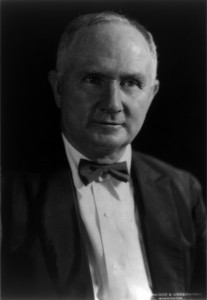To water many western valleys will involve drying up the streams that flow through through them, and this physical fact ought to be faced frankly and honestly.
That’s Elwood Mead, sounding an awful lot like a proto-environmentalist, in his 1903 book Irrigation Institutions. Mead, who headed the U.S. Bureau of Reclamation from 1924 to 1936, oversaw plenty of drying up. He headed the agency when Hoover Dam was planned and built. But he wasn’t being a proto-environmentalist, just a pragmatist, in pointing out that people living downstream of the nation’s big irrigation works needed to recognize the fact that the water might no longer reach them, and that the nascent legal structures for water allocation at the time would need to recognize this reality.

